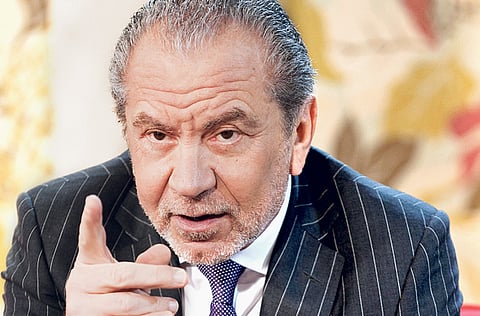Alan Sugar's bitter-sweet career
The arrogant and brash entrepreneur Alan Sugar reduced football to business but is not without his admirable qualities

What You See Is What You Get: My Autobiography. By Alan Sugar, Macmillan, 609 pages, £14.99
I will be honest — I wasn't looking forward to reading this book. I don't like Alan Sugar. Or at least I didn't like Alan Sugar — now, after reading his story, I can just about tolerate him.
I didn't like Alan Sugar because of his arrogance and bluntness and the fact that he was a new breed of owner who began to turn the English Premier League from a football game into a business. He was an entrepreneur with an edge.
Yes, it was OK for the likes of Sir Elton John to buy a stake in Watford FC but Alan Sugar was different. He was brash, arrogant and splashy — a kind of personification of Tottenham Hotspur itself. Me? A staunch fan of Everton — a true-blue football club with working-class roots, not like the arrogant, pompous cockneys from White Hart Lane.
Sugar bought Spurs along with Terry Venables in June 1991 after a protracted battle with disgraced newspaper baron and alleged Israeli spy Robert Maxwell. Those who thought the combination of Venables's footballing genius and Sugar's deep pockets were a winning combination were sadly wrong.
Sugar treated the club as a business, hardly the way to get top footballers to perform. On one memorable occasion, he accused the club's star striker, Teddy Sheringham, of feigning injury. It was one of the reasons Sheringham left the club.
In his nine years as chairman, Sugar's Spurs won just one trophy — the League Cup in 1999 — and never finished in the top six. On the night before the FA Cup Final, Sugar fired Venables, a man long seen as the acceptable face of the franchise.
And that is precisely it — Sugar saw his investment in Spurs as a business opportunity. He was the only one among the most senior premiership sides' owners to support satellite broadcaster SKY's bid to buy television rights. The other teams of Arsenal, Everton, Liverpool and Manchester United voted to go with the competing bid from Britain's Independent Television Network — which has promised to show more of the Top Five's games more often.
What is forgotten in this incident is that Sugar had a vested interest in SKY succeeding. His computer and technology company, Amstrad, where he made his fortune, was in negotiations with SKY to manufacture satellite dishes. Conflicts of interest are not moral dilemmas, they are opportunities for Baron Sugar of Hackney to make some quick cash.
From his rough and tumble beginnings in Hackney, in London's East End, Sugar has always had an eye for a quick quid. And has always been willing to suspend his moral compass for the sake of getting the deal done. He, if anything, is the consummate dealmaker.
Formal education and Alan Sugar are not two phrases that sit easily in the same sentence — he left school at 16. That is not to say he is not smart — quite the contrary. School was boring and failed to excite a youth who always knew he could make it big in the real world.
His first venture was selling car aerials and cheap electrical goods literally out of the back of a van with his savings of £100. I guess he has done all right for himself — he is only worth a little over £1 billion now.
So how did he get there? Well, let's put it this way — he is a hard-nosed businessman with an innate sense of what the next big thing is. And don't get in his way of getting there: He is ruthless and ambitious, and he is good. Real good, and he doesn't suffer fools gladly.
When he ran Spurs, he went through seven first team managers, changing them with as little thought as if he were changing his socks. But he is also loyal. If you can work with this workaholic, you will be rewarded richly with a generous character with all of the charm of a rogue — honest to admit his dishonesty and able to laugh at the deals done.
And how those deals are done is the joy in What You See Is What You Get. The book is full of insights into the wheeling and dealing of Sugar's Amstrad — based on the acronym of Alan Michael Sugar Trading — a company he founded in 1970.
His first big thing was using high-injection moulding to make record players cheaper and more plentiful than any of the competitors in the field.
He was innovative. Then came amplifiers and tuners and anything else that cashed in on the growing appetite for cheap consumer electronics.
In 1980, Amstrad listed on the London Stock Exchange, doubling its profit and market capital every year during the decade. Sugar, though, for all of his success, has a craving to be recognised as a self-made entrepreneur — a psychological flaw that makes him crave recognition over and above his bank balance, almost as if those humble beginnings in Hackney need to be shaken off by public vindication.
Sugar became a household name in Britain with his version of The Apprentice, seeking out the right candidates in a reality show to run real estate ventures and manage key landmark properties. He puts them through a series of tests to try their skills before dispatching the loser with his trademark "You're fired".
Let's face it, after pulling himself up from his bootstraps to being a self-made billionaire, he knows a thing or two about being successful in business.
But I still don't like Alan Sugar.
Sign up for the Daily Briefing
Get the latest news and updates straight to your inbox


